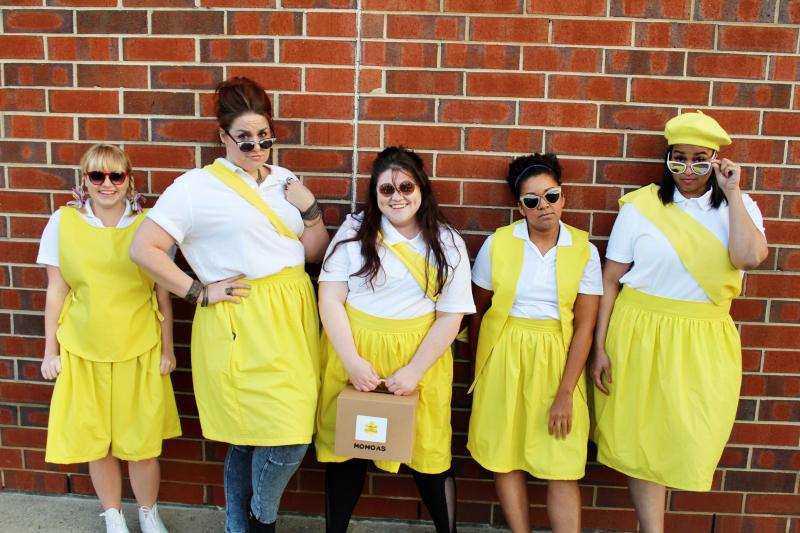Review: THE DAFFODIL GIRLS Vie Viciously for Survival – and a Pony
 Down in Dallas, Fun House Theatre producer Bren Rapp and her co-founder, artistic director Jeff Swearingen, don't do children's theatre the usual way. The children at Fun House are the actors onstage and not necessarily the target audience. So when Rapp looked for an inspiration to challenge her students, David Mamet's Glengarry Glen Ross wasn't too far of a stretch. To translate the Darwinian struggles of real estate salesmen embroiled in a monthly sales contest into terms her actors could identify with - an annual Girl Scout Cookie drive - Rapp leaned upon Swearingen's play writing skills.
Down in Dallas, Fun House Theatre producer Bren Rapp and her co-founder, artistic director Jeff Swearingen, don't do children's theatre the usual way. The children at Fun House are the actors onstage and not necessarily the target audience. So when Rapp looked for an inspiration to challenge her students, David Mamet's Glengarry Glen Ross wasn't too far of a stretch. To translate the Darwinian struggles of real estate salesmen embroiled in a monthly sales contest into terms her actors could identify with - an annual Girl Scout Cookie drive - Rapp leaned upon Swearingen's play writing skills.
The result in 2013 was a Dallas-Fort Worth theatre legend: THE DAFFODIL GIRLS. In a further mutation five years later, Three Bone Theatre is currently premiering the first all-adult production of Swearingen's script at Spirit Square.
Make no mistake, this is thoroughly Swearingen's play, not just a servile rechanneling of Mamet's testosterone-driven, potty-mouthed arguments through the lips of innocent preteens. Plot and dialogue only faintly echo Glengarry most of the time, language is relatively cleansed, and beware: complete sentences lie ahead. Another way to view the difference is to note that Swearingen lets plenty of air into the relatively claustrophobic world of Glengarry. Mamet only gave us three two-handed scenes before intermission. Swearingen admits more characters - and more of the world outside of the Daffodils' treehouse.
According to Willa, who parallels Mamet's Williamson, the entire Daffodil chapter has been endangered by their slumping cookie sales, not just the low person on the totem pole. Even before Shelly's quest for hotter leads, in a humiliating confrontation with the officious Willa, we find Swearingen modernizing the story and infusing fresh air into the competition. Shelly is outdoors as the lights go up, on her cellphone first with her mom and then her dad, pleading with them to help boost her numbers.
Opening up his story, Swearingen doesn't ease up on the stress that Mamet plunged us into, but he does manage to instantly wrap that stress into a more juvenile mindset. Parents at the Duke Energy Theater can only sigh. The Daffodils' cookie quotas merely weaponize our children's pre-existing propensity toward clinging, dependent querulousness, and cellphones help it go nuclear.
When she isn't consulting her rules and charts - or obsequiously receiving Blayne, the regional Daffodil emissary with the motivational charms of a drill sergeant - Willa seems to live next door to the troop's treehouse. All we see at stage right is Willa's housefront, enough for her to peep out of and defer to parents lurking within. Flanking the treehouse interior in Ryan Maloney's set design, a Peanuts-gone-to-seed affair, is that pillar of preteen commerce, a lemonade stand (with a crayon rental side hustle). There we will find Raimi, the top-selling Daffodil, closing in on a high-gross sale to hapless, sickly Jenny Link, who may be allergic to every ingredient in those cookies.

Raimi is modeled on Mamet's sales ace, Roma, who circles his prey, Lingk, ever so circumspectly in the last Chinese restaurant scene of Glengarry prior to intermission. The real bridge to Act 2 in both dramas is the discussion about ransacking the sales office, ostensibly for cash and receipts, but really so the desperate accomplices can get their hands on those hot sales leads that are guarded so closely. In Glengarry, the conspirators were Dave Moss and George Aaronow, with Moss as the intimidator. Here the crooked bullying malcontent is Dana, bullying a kindergarten neophyte, Georgina.
Casting the women who will regress into girlhood in daffodil-colored uniforms, Three Bone director Amanda Liles leans on size in her casting when we need to differentiate between their purported ages. Layla Sutton as Dana towers over Kitty Janvrin as Georgina, conjuring up a Trunchbull-Matilda contrast more readily than any relationship Mamet set down. You'll notice a similar disparity between the imposing Iris DeWitt as Blayne, the regional enforcer, and the comparatively petite Iesha Nyree as the deferential Willa.
Rather than playing down these contrasts, Liles encourages her actresses to play them up. Among them, Nyree gets the best opportunity to surprise, for Willa may be a worm and a suck-up, but she's a cunning one, and her moment will come. In proving that crime doesn't pay, Nyree gets to unleash a volcano of pent-up emotion that is quite consonant with Willa's customary sliminess, but she only briefly wrests our primary attention away from the girls at the opposite ends of sales totem pole.

Kerstin VanHuss as the pathetic Shelly and LeShea Nicole as the regal Raimi give the performances you'll remember longest. If Shelly would sweeten up, stop acting so spoiled, and show a little more initiative, she might shape up as the sort of underdog you could root for, like the chubby Tracy Turnblad in Hairspray. Yet in her pluckier moments, Van Huss succeeds in making this mopey, self-pitying Shelly more appealing than any of Mamet's predators, so I did find myself rooting for her late in the action despite my better judgment.
Raimi oozes all the self-confidence, superiority, and staunch entitlement that Shelly lacks, and Nicole makes her so very slick, patient, and condescending as she sets about fleecing poor Jenny for over 20+ boxes of toxic cookies. The fruits of Raimi's finesse make her a victorious queen when she finally deigns to return to the ransacked treehouse. Nobody is taking away her damn pony party, the prize that goes to the troop's top seller, and you can hear Nicole playing the race card as she proclaims this - slapping that card down on the table with gusto, absolutely shameless. As in previous Nicole stage exploits, she's intensely eccentric and laugh-out-loud funny, sometimes without even saying a word.
Of course, Nicole's imperious cruelty is greatly augmented by the immense frailty of Valerie Thames as Jenny - though it must be said those breathing tubes sprouting from her nostrils give her a head start. To a lesser extent than Nyree as Willa, Thames will acquire the beginnings of a backbone in the Act 2 denouement when Jenny finally gets a word in edgewise.
Similarly, it isn't just Willa who nudges us toward empathizing with Shelly. After her cameo as Blayne, DeWitt returns to belittle Shelly, her cookies and her Daffodils uniform as Lisa, a preppy girl who acts like giving Shelly the time of day is more than sufficient charity. Rounding out the cast is Tiffany Bryant Jackson as Cora. Mostly quiet as she runs the lemonade stand before intermission, Cora turns out to have quite a bossy streak in the heat of the great burglary investigation.
Maybe the biggest surprise in Swearingen's fun-filled riff on Mamet's Glengarry Glen Ross was how much plot and action the Dallas playwright squeezed into a script whose running time didn't quite reach 80 minutes. Amazing what you can do with short speeches and complete sentences.
Photos by Ramsey Lyric
Videos
